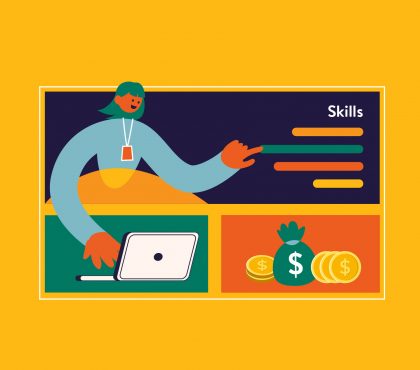Microlearning, with its bite-sized, accessible content, is ideal for today’s learners. However, converting classroom-based materials into effective microlearning modules is challenging. If you’re unsure where to begin, we’re here to guide you to custom corporate microlearning modules, ensuring a smooth and timely transition to this modern learning approach.
How to Create Microlearning Content from Existing Training Materials
Most companies have a wealth of offline training materials by the time they transition online, but these lengthy contents often clash with the short, focused nature of microlearning. Learners typically seek specific information and prefer concise, impactful content, unlike traditional classroom materials that may include unnecessary introductions.
Additionally, the human attention span is notoriously brief, averaging around 8 seconds. This makes longer lectures less effective compared to microlearning courses. Short, engaging videos that concentrate on individual topics can maximize learning efficiency within this limited timeframe.
So, how to effectively create effective microlearning courses by repurposing training materials?
Cut to the Chase
In microlearning, learners come to you with a clear goal of what to learn. Therefore, exclude a lengthy intro or contextual information. Drop the fluff and get right to what your audience demands. This should keep the duration down while keeping learners engaged.
Diversify with Multimedia
Microlearning might be brief, but it doesn’t have to be boring. When creating custom corporate microlearning modules, try to add games, simulations, podcasts, videos, or infographics to make training more engaging. Try to be creative with your presentation.
Let’s take a look at the video below from Permaculture Design Course, for example.
As you can see, the video doesn’t just plainly explain the concepts, it also utilizes different elements such as motions, charts, and custom graphics to clearly present the content. This is extra-effective in drawing the audience’s attention, thus, increasing their comprehension.
To learn more about Permaculture’s success, hop on over to our complete case study.
Recommended reading:
Preparation Checklist to Power your Digital Transformation
Wondering if you miss anything in your preparation to digitize your training? This is just what you need.
How to Maintain Training Quality of Microlearning Modules
Microlearning is effective, but not every business has the expertise to utilize it. Most organizations are new to converting longer courses into microlearning-friendly materials. The lack of in-house experts and experience raises concerns about the uncertain quality of the product. You may find no actual evidence to determine whether online microlearning is better than conventional methods.
Digital Learning Managers are also aware that many learners prefer in-person training to eLearning. They say the high level of human interaction makes the lessons approachable. So, to achieve the best proficiency, your microlearning course has to imitate that conversational appeal. It demands a careful selection of tone, wording, and presentation.
So, how do you maintain the quality as well as the elements of human interaction in custom corporate microlearning modules?
Call in the Experts
Having a chat with professionals is the best way to get an optimal solution. If your company does not have an in-house expert, you can always call someone who does. Companies like F. Learning Studio have been offering a helping hand to those with little experience in transitioning into online training solutions.
We communicate with businesses to find the best approach to their situations in a timely and cost-effective fashion. Together, we will identify the parts of the existing training content that need clarifying. F. Learning Studio then proceeds to create interactive illustrations for the selected segments only. That’s how we integrate animation into your custom corporate microlearning modules while keeping the expense down.
Create Connection Using Animation
As we have mentioned previously, human interaction counts in online microlearning. Digital Learning Managers can manipulate different elements in the courses to connect with learners. Animation is perfect for this. You can use custom designs and color schemes to imitate the company’s workspace, thus, creating familiarity. Then, to trigger a sense of human interaction, you have the option to include story-telling in a conversational and approachable voice-over.
A prime example of this would be the case of One QBE.
Being a global corporation, One QBE values consistency in internal training for global employees. F.Learning Studio decided to keep that idea by designing a video with the company’s familiar palate and workspace. It imitates One QBE’s environment to help employees pick up the information without hesitance.
How to Utilize Available Resources to Boost Custom Corporate Microlearning Modules?
When repurposing existing assets for microlearning, the biggest challenge has to be to rapidly create the content. There’s simply not enough time to go through hundreds of material folders. Big businesses cannot afford to lose any time, especially when it comes to training.
But L&D and HR professionals will know that managing the timeline isn’t the only worry about the transition to microlearning. You’ll be up to your neck with different tasks to strategically support the movement.
How can you repurpose training materials into quality content for microlearning while efficiently keeping track of time?
Make The Most Out Of Available Resources
Focus your time on creating custom, organization-specific content for your organization. Try to reduce the time required to design graphics for your courses. Use available resources to find pre-made replacements instead. Websites like Canva or Pixabay provide tons of free options to work with.
Partner Up With a Trusted Provider
We understand the struggle of Digital Learning Managers in these strange and uncertain times. Converting existing assets for microlearning is way too daunting of a task to take on your own.
If you want to find a trusted partner with established experience in online training, try our services at F.Learning Studio. Our team of experts guarantees to deliver top-quality illustrations so that you can devote your time to developing in-depth content for the courses.
Here’s at F.Learning Studio, we’re proud to be:
- Experienced in Managing Large Projects
Since you’re breaking down existing materials into bite-sized, focused pieces for microlearning, the course will inevitably have multiple episodes. For young and inexperienced companies, managing this gigantic workload is a real challenge. That’s why you need an expert like F.Learning Studio. We have the insider know-how to handle large projects from start to finish.
- Capable of Handling All Fronts of the Project
F.Learning Studio is always available for aid whenever you need it. Each of our projects comes with its consultant, animators, illustrators, and Project Managers. We make sure your concerns are voiced and attended to in a timely fashion. Now that’s a customer-centric experience!
- Attentive Listeners
F.Learning Studio values communication with our clients. We firmly believe that clear communication is the key to optimizing production time. Your concerns, needs, and demands drive our operation. That’s how we can guarantee quality and also limit back-and-forth feedback to save time.

Recommend reading:
4 Tips to Better Custom Corporate Microlearning Modules
1. Create A System To Manage Your Materials
Effective management of your microlearning courses starts with categorizing the materials you have. We’re talking about hundreds of folders and thousands of files here. As a result, you must maintain a tidy and ordered appearance. Always have a system to control the content and access what you need immediately. For instance, you can group relevant videos or tag frequently viewed ones. This way, learners can quickly access related information, and you’ll have a shortcut to all materials.
2. Make Your Lessons Snappy
There’s no need to include too much information in a microlearning video. The whole point of it is fast and efficient learning of a certain piece of knowledge only. Take your long materials and break them down into smaller ones with a short and singular focus.
3. Draft A Template
Making a template is a fast and effective way to deploy your training content. It’s like a framework for the whole project, specifying how each piece of information should be explained. You can then skip the outline design step and go straight to showcasing your content.
4. Future-Proof The Courses
Always think about how your content will age. The longer it stays relevant, the better. You can save time revisiting older videos and devote yourself to developing new long-lasting ones. This is also true with the course design. It should be responsive and mobile-friendly. Most learners now prefer the ability to access new knowledge right from the convenience of their phones. Make sure your content can appear on mobile devices.
Conclusion
Recycling old training materials is a cost-effective way to create quality microlearning content, enabling businesses to maximize existing resources. By repurposing these assets, companies can develop custom corporate microlearning modules that deliver quick, targeted bursts of information, accessible from anywhere with an Internet connection. This approach not only saves time and money but also aligns with the future of online learning, where concise, impactful training is essential for maintaining workforce engagement and productivity.
If you ever need assistance in customizing microlearning modules for training, contact us at F.Learning Studio. We will guarantee you our best services and top-quality production.
- WhatsApp: (+84) 378 713 132
- Email: [email protected]
- Fanpage: https://www.facebook.com/f.learningstudio
- LinkedIn: https://www.linkedin.com/company/f-learning-studio/
You May Also Like:
- How to use animation in online training
- Top 12 Amazing Training Video Production Companies In 2026
- 6 Ways to Improve Online Training Experience for Employee

Sean Bui, the founder and creative director of F.Learning Studio, is a respected leader in the e-learning and multimedia production industry. With over 10 years of experience, he has dedicated his career to helping organizations create engaging and impactful learning experiences.
Under his leadership, F.Learning Studio has grown into a trusted partner for organizations in the education, healthcare, and corporate training sectors, producing over 2,000 minutes of educational animation.








![Corporate Video Production Costs in 2026 [Full Pricing Guide] 9 image10 Corporate Video Production Costs in 2026 [Full Pricing Guide]](https://flearningstudio.com/wp-content/uploads/2025/06/image10-420x370.jpg)